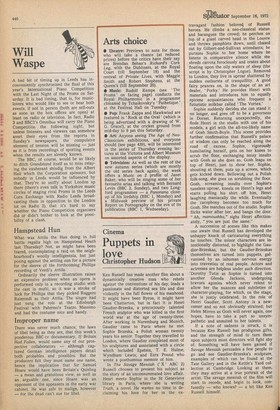Will Waspe
A bad bit of timing up in Leeds has inconveniently synchronised the final of this year's International Piano Competition with the Last Night of the Proms on Saturday. It is bad timing, that is, for musiclovers who would like to see or hear both events, if not in person (both are sell-outs as soon as the box offices are open) at least on radio or television. In fact, Radio 3 and BBC1's Omnibus will carry the Piano Competition the following night, but unless listeners and viewers can somehow avert their eyes from the reports in Sunday's newspapers, the compulsive element of tension will be missing — just as it is from recordings of sporting events when the results are already known.
The BBC, of course, would be as likely to ditch Grandstand itself as to miss relaying the exuberant shindig from the Albert Hall which the Corporation sponsors, but nobody in Leeds would be influenced by that. They're so sniffy about London up there (there's even talk in Yorkshire music circles of staging rival Proms in the Leeds Corn Exchange with Radio Leeds broadcasting them in opposition to the London lot on Radio 3), that it's hard to say whether the Piano Competition organisers did or didn't bother to look at the possibility of a clash.
Hampstead Hun
What was Attila the Hun doing in full battle regalia high on Hampstead Heath last Thursday? Not, as might have been feared, contemplating a raid on the neighbourhood's woolly intelligentsia, but just posing against the setting sun for a picture for the sleeve of the forthcoming Phillips recording of Verdi's Attila.
Ordinarily the sleeve illustration raises an expensive problem when an opera is performed only in a recording studio with the cast in mufti, so it was a stroke of luck for Phillips that they picked Ruggero Raimondi as their Attlia. The singer had just sung the role at the Edinburgh Festival with Palermo's Teatro Massimo and had the costume nice and handy.
Improper name
There was never much chance, the laws of libel being as they are, that this week's ponderous BBC-tv documentary, If Britain Had Fallen, would name any of our prospective collaborators — although captured German intelligence papers detail both probables and possibles. But the producers felt they must name one name, hence the implication that Sir Samuel Hoare would have been Britain's Quisling — a mean and gratuitous view, as well as an arguable one, since Hoare was an opponent of the appeasers in the early war cabinet. He was safe to malign, however — for the dead can't sue for libel.


































 Previous page
Previous page